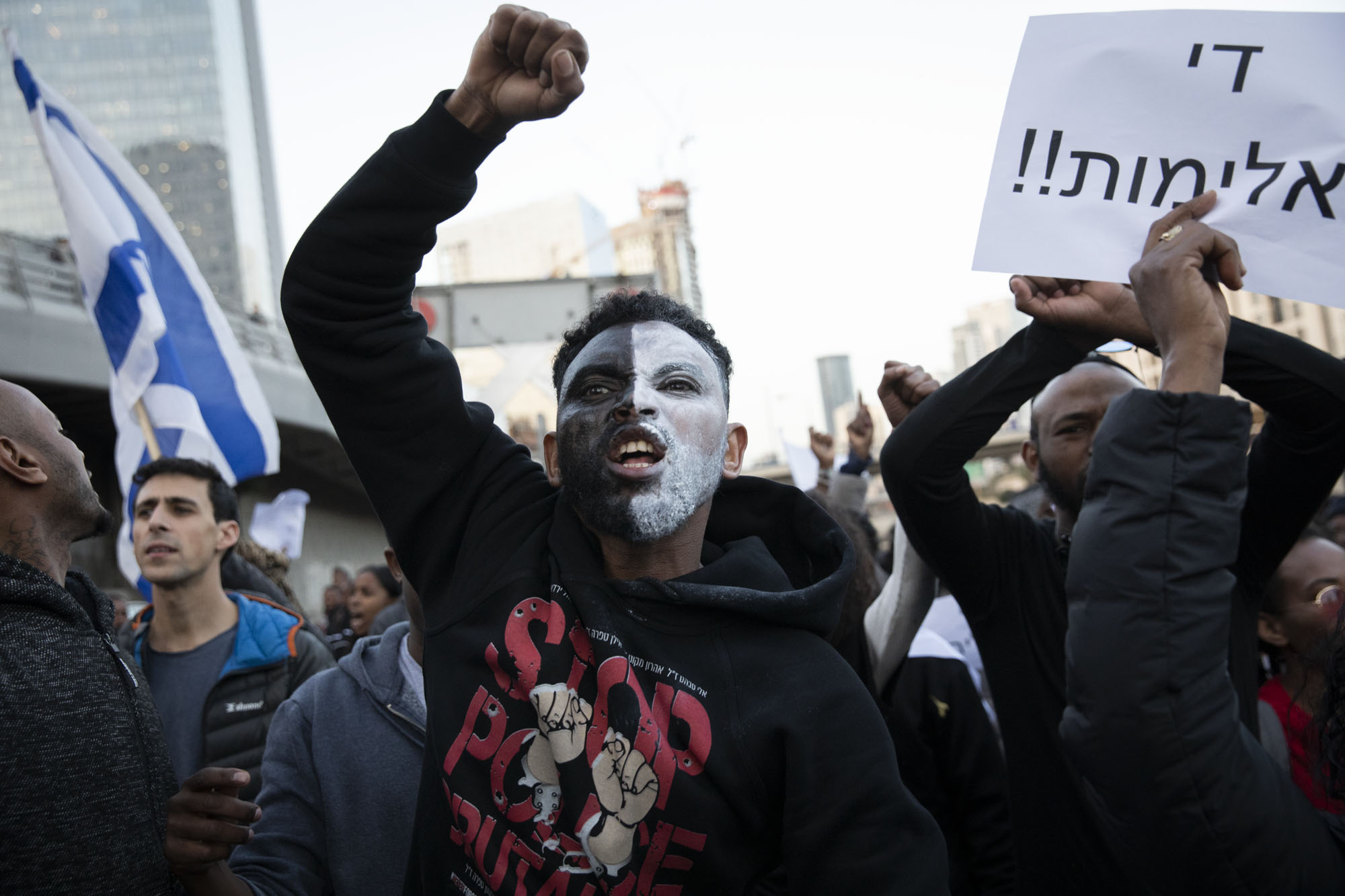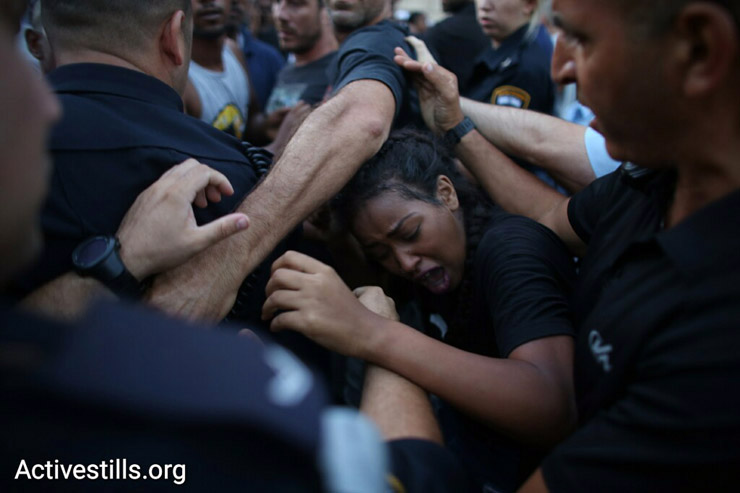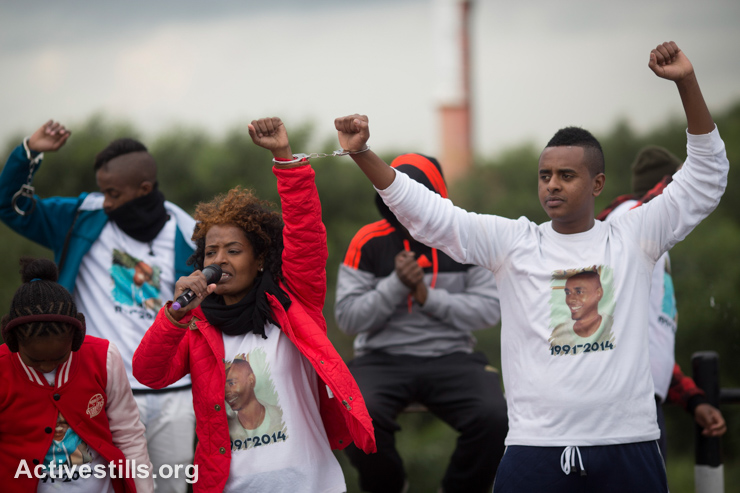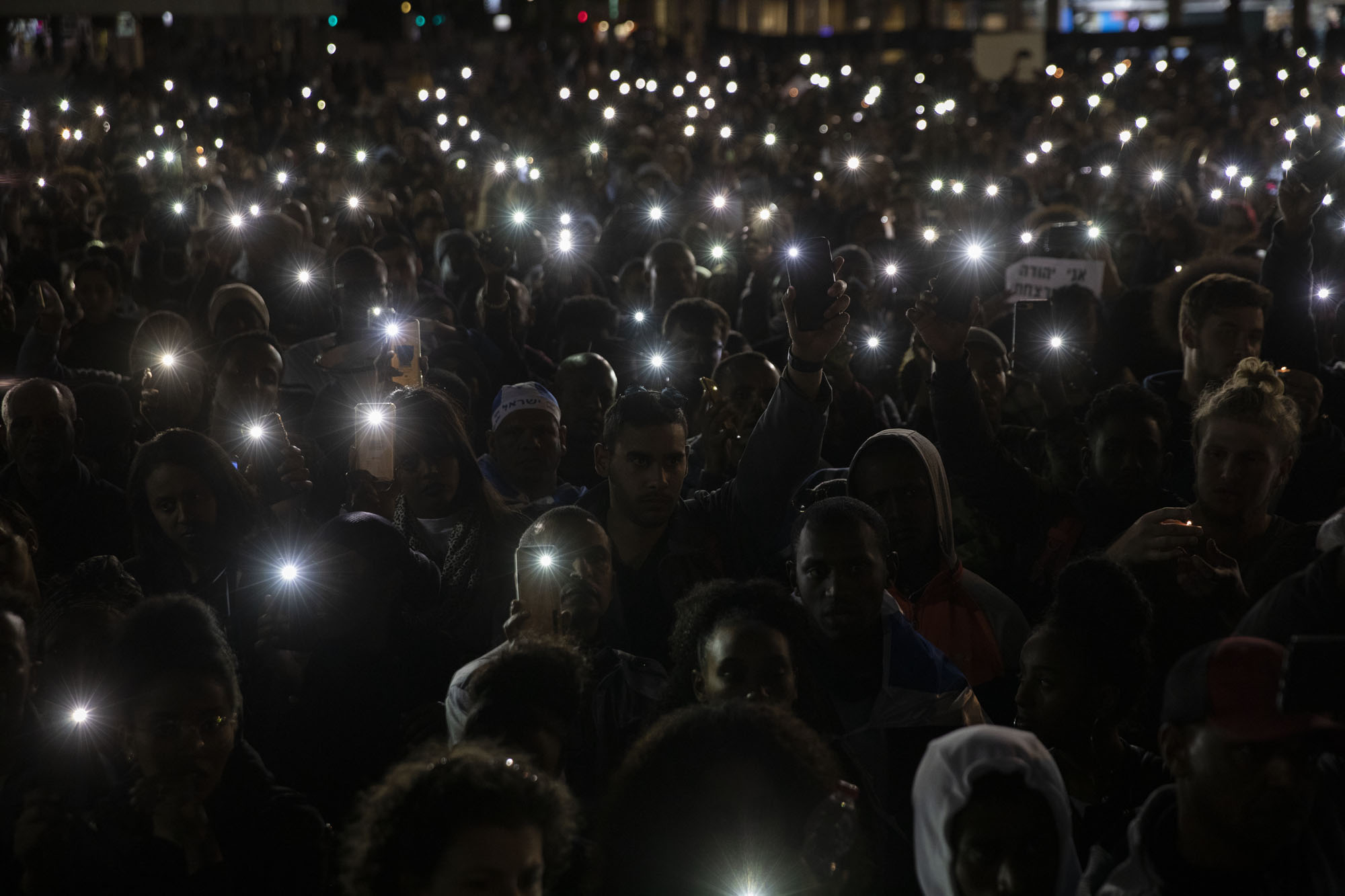The shooting of Yehuda Biadga reignited tensions between Israel’s Ethiopian community and police, who have long been accused of using a heavy hand against the country’s minorities. ‘Police brutality is a result of racism against black people in this country,’ Ziva Mekonen-Degu says.

For the third time in as many years, thousands of Ethiopian citizens of Israel demonstrated against police violence this week. On Jan. 18, officers gunned down Yehuda Biadga, a 24-year old Israeli of Ethiopian background, who was wandering the streets of his neighborhood in the city of Bat Yam, just south of Tel Aviv.
According to family members, the young man, who suffered from severe PTSD after his release from the Israeli army, was distraught and carrying a knife when he left his home in the evening hours of that fatal day. The family immediately called the police, informing them that Biadga suffered from a mental illness and had not taken his medication, but that he did not pose any danger.
Police took just over 50 minutes to arrive and commence searching for the young man. It was during the belated search that police said one of the officers saw Biadga approaching with a knife and ordered him to stop, but he ignored the officer’s warnings. The officer, who reportedly said he had reason to fear for his life, fired two shots at Biadga’s upper body, killing him. Police officials rejected accusations that the officer opened fire because Biadga was black, claiming instead that the policeman’s life was at risk.
The Justice Ministry’s Police Internal Investigations Department — an external agency meant to investigate and prosecute officers — has launched an investigation. Police placed the officer on leave, per his request.
The shooting reignited tensions between Israel’s Ethiopian community and the police, who have long been accused of using a heavy hand against the country’s visible minorities, particularly citizens of Ethiopian descent. Over 15,000 Ethiopian Israelis and their supporters marched in the streets of Tel Aviv on Wednesday, blocking the Ayalon Highway, one of the country’s main arteries, and calling for an end to “racist police violence,” which they say is a daily experience for them.
Despite the large turnout, members of the Ethiopian community are in despair over police brutality. Biadga’s killing is just the latest, most extreme incident, says Efrat Yerday, a prominent Ethiopian-Israeli activist, but it is a salutary example of the way Israeli officers treat young Ethiopians. “The police want to talk about [Biadga’s] violence, [but] they don’t want to talk about the hour that the family waited for officers to arrive or the fact that they shot him twice in the upper body [instead of his legs]. They are building a narrative that makes the officer look like the victim in this situation.”

Wednesday’s march ended with a vigil in Rabin Square, one of Tel Aviv’s central gathering points and the site of bloody clashes in 2015, when thousands of Ethiopians demonstrated following a number of high-profile incidents of police violence. Those clashes left dozens wounded, after police on horseback beat protesters with riot batons and used tear gas and stun grenades to disperse them. Israelis were stunned by widely disseminated images of bloodied protesters in the country’s most famous public square.
Less than a year later, Ethiopian-Israelis turned out in the streets once more. This time they were protesting the decision not to prosecute two officers who tasered Yosef Salamsa, a 22-year-old Israeli-Ethiopian, in the northern town of Zichron Yaakov in 2014.
Three months after the incident, Salamsa, who had been traumatized by the encounter, committed suicide by jumping off a cliff. Investigators did not find the officers guilty of criminal conduct, but they recommended disciplinary action for lying about warning Salamsa before firing a taser at him, and for leaving him outside the police station for 35 minutes, injured and unattended.

‘It’s incitement against Ethiopians, plain and simple’
More than 135,000 Ethiopian Jews live in Israel, most of whom are the children of those who immigrated in the mid-80s or early 90s. Now second-generation Israelis, most of the community is still struggling to be integrated into mainstream society. Their socio-economic status is low, and they suffer gaps in housing, education, and employment. According to a 2011 report by the Myers-JDC-Brookdale Institute in Jerusalem, 65 percent of Ethiopian children in Israel live in poverty.
“To be Ethiopian in this country is to be constantly struggling for something,” says Ziva Mekonen-Degu, executive-director of the Israel Association for Ethiopian Jews, established in 1993 to close social gaps and improve the lives of Ethiopian Israelis. “We have been struggling since we came to this country to be recognized and treated fairly. Today the struggle is against police brutality, which is a result of racism against black people in this country.”
Yerday, the activist, says the underlying reasons for police profiling are two-fold: a deep belief that Ethiopians, and black people in general, are inherently more violent; and the media’s failure to investigate incidents of police violence. Instead of investigating independently, media outlets often report the police version as straight news, she says.
“They claimed that the march would be violent, that the lives of police officers would be put in danger. All the biggest news outlets took their headlines straight from the police playbook. It’s incitement against Ethiopians, plain and simple,” she says.
This time, however, the demonstrations were largely peaceful. Police refrained from using violent crowd control measures, as they had in 2015. There were a few isolated clashes when a small group of protesters broke away from the main demonstration, damaging parked cars, trashing a café, and setting fire to trash cans. Police arrested 11, nine of whom were brought in front of a judge on Thursday morning.

‘It’s about racism against black people writ large’
According to police data provided to the Israel Association for Ethiopian Jews, the number of criminal cases police opened against members of the Ethiopian community between 2014 and 2017 increased by 20 percent, even as it decreased by six percent for the total Jewish population. During those same years, cases opened against Ethiopians accused of assaulting an officer increased by 25 percent.
Moreover, a report published by the Public Defender’s Office in 2016 found that almost 90 percent of young Israeli offenders of Ethiopian descent are sentenced to prison — three times the percentage for non-immigrant Jewish minors and twice the percentage of Arab minors.
Both social gaps and police violence have pushed governmental authorities to act. Following the bloody protests of 2015, the Israeli government established a ministerial committee headed by Prime Minister Benjamin Netanyahu to look at recommendations made in the 2016 Palmor Report, which acknowledged institutionalized discrimination against Ethiopians and sought solutions that would close socio-economic gaps.
The ministerial committee adopted a 71-point plan to integrate Ethiopians at an estimated cost of NIS 165 million ($45 million) per year. The plan includes increasing the percentage of Ethiopian-Israelis eligible for high school matriculation; increasing the scope of gifted and outstanding students, and placing them in appropriate education programs; increasing the number of officers in the army and in the police force; integrating academics into higher paying jobs in the private sector; and subsidizing vouchers for extracurricular activities for children.
“The Palmor Report showed very clearly that Israeli police disproportionately target Ethiopians,” says Anne Suciu, an attorney for the Association for Civil Rights in Israel who focuses on racial profiling and police violence.
Suciu says the government has recognized that Ethiopians are over-policed, among other minority groups, and it is this recognition that has led the Justice Ministry to allow Ethiopians to request their criminal records be expunged. Still, Suciu says, the police continue targeting Ethiopians due to the color of their skin.
Meanwhile, the police have poured millions of shekels into various programs to strengthen ties with the Ethiopian community — a decision that has been criticized by Ethiopian-Israeli leaders. “This is the same police whose former commissioner said it is ‘natural’ for officers to suspect Ethiopians,” says Mekonen-Degu. “I don’t need them to learn my culture, I don’t need them to eat my food. I need them to stop looking at my son suspiciously.”
The problem, Yerday adds, is anti-black racism among police, whether it targets Ethiopian citizens or African refugees: “If we think that racism begins and ends with Eritreans and Sudanese asylum seekers, we are sorely mistaken. It’s about racism against black people writ large.”
Yerday is exasperated, and it shows. “I don’t know what to tell my community anymore,” she says. “People are calling me every day to tell me they feel helpless and hopeless. Men and women who are afraid of the future. They are afraid for themselves. This place is deteriorating, and I am afraid that we won’t have any reason left to stay here. It’s extremely worrying.”

